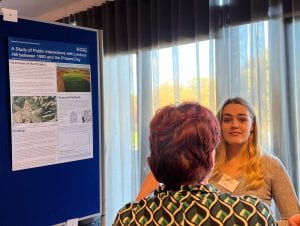We are pleased to announce the launch of our Reading Classics Seminar Series for Semester 2 2025, which will boost our Wednesday afternoons with constructive and stimulating lectures and discussions on various aspects of Classics research!
In this series of lectures, starting on 19 February 2025, we welcome a diverse group of speakers in our Departmental seminars. Our Semester 2 seminar series will explore a variety of topics and periods of Classical studies. Most seminars are hybrid and will be livestreamed on MS Teams. No registration is required. Attendance is free and open to all!
We are also pleased to invite you to attend the 2025 Ure Lecture by Dr. Jane Masséglia (University of Leicester) on “The Trojan War Mosaic at Ketton: How Greek Stories Came to Roman Britain”. Join us on Friday, 28 March 2025 at 5 PM for an exciting talk and reception. Entry is free, but booking is required here.
For more information, contact e.m.m.aston@reading.ac.uk.
Below you can find a poster with all titles and times (UK Time):
Full list of titles
19 February – 16:00-17:30 (Edith Morley G25)
Prof. Lene Rubinstein, Royal Holloway, University of London, Displaced civilians in fourth-century Athens: Social repercussions and political challenges.
20 March (Thursday) – 16:00-17:30 (Palmer 102) [This talk will only be in-person]
Dr Elena Chepel, University of Vienna, Festival mobility in Graeco-Roman Egypt.
28 March – 17:00-18:00 (Henley Business School G15)
Dr Jane Masséglia, University of Leicester, The Trojan War Mosaic at Ketton: how Greek stories came to Roman Britain. [Registration Required Here]
30 April – 16:00-17:30 (Edith Morley G25)
visual artists and researchers Aaron Ford (Institute of Classical Studies) and Hardeep Dhindsa (King’s College London), Race, Empire, and Decoloniality Seminar.
14 May – 16:00-17:30 (Edith Morley G25)
Alessandra Rocchetti, University of Oxford, The spatiality of magic across curse tablets, literary, and para-literary sources.
21 May – 16:00-17:30 (Edith Morley G44)
Dr Davide Massimo, University of Nottingham, “Hellenisation” and cultural identity in the Hellenistic world: insights from verse inscriptions.


























